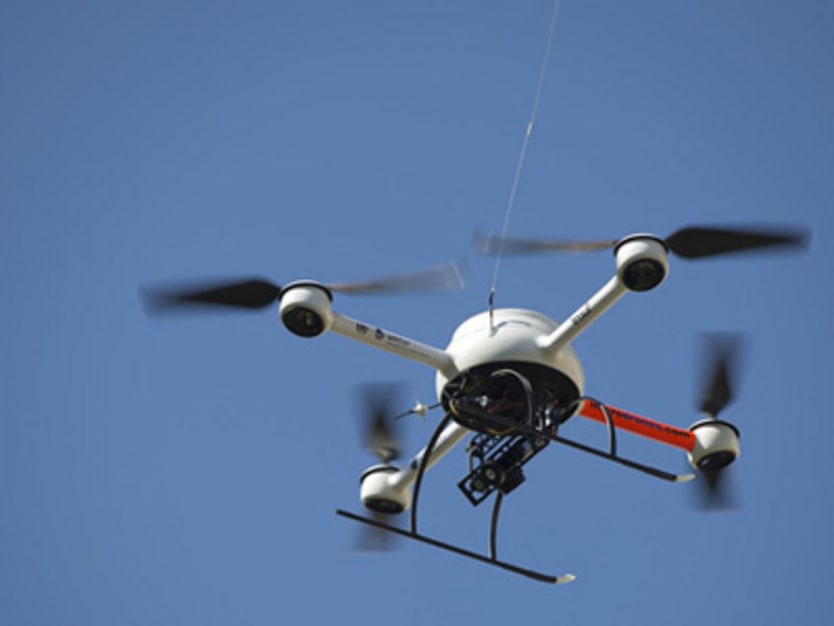
A while back, a man came to our office with a white box containing a small quadcopter after hearing some buzz in the news about drones and remote piloted aircrafts. He asked us, “What can you do with this?”
We looked at the drone and remained silent for a minute or so. Our tongue-in-cheek thought was that it would be perfect for delivering intra-office mail or donuts to the participants of our Technology Deep Dives.
However, the more we thought about it, we started realizing the potential that drones could have for some of our projects.
In our quest to figure out how to use drones for delivering donuts, we are learning about uses that other organizations have for drones and unmanned aerial vehicles. From conservation efforts to data collection, drones are becoming tools for a variety of development activities — and this is a trend that experts expect to continue growing in the coming years.
1. Conservation
Since 2012, the GeoEye Foundation and the University of Maryland have been working on the Falcon UAV project, aimed at tracking poachers in the Olifants West Nature Reserve in South Africa. These drones fly through the night, employing infrared cameras to detect the movements of poachers. Since the drones are small, they do not disturb the animal populations. In the past few months, two poachers were intercepted and reported to local authorities. Additionally, the group is using the data collected to predict the future movements of the poachers, which facilitate their interception.
2. Transportation
Providing assistance to villages that are not accessible via roads is an area of interest for organizations that work with drones. Since 2011, Matternet has been testing its drones in places like Haiti and Lesotho to develop transportation networks for delivering information and goods to rural villages. Paola Santa, co-founder of Matternet, recently spoke about the cost-efficiency of drone delivery networks in developing countries. “A case study done in Maseru, Lesotho showed that the entire … capital could be connected by a drone network for $900,000. In contrast, the cost of building a 2 km road is $1 million. A whole network, rather than one road could be lifesaving,” Santana told The Huffington Post.
3. Emergency response
In 2013, the U.S. National Guard deployed drones to support rescue personnel fighting against the rim fires, which expanded to more than 160,000 acres near Yosemite Park. Drones delivered full motion video imagery on remote portions of the fire, spot fires, status of containment borders, and facilitated the process of identifying alternates transportation routes. The images that were collected helped in the coordination of relief-efforts on the ground. Similar efforts took place in Haiti, Japan, and the Philippines. Particularly, in the Philippines and Haiti, the aerial live video was crucial in identifying refugee clusters. Drones are also being used to produce video reports on droughts, fires, and migration of aviary species. However, ethical questions surrounding the use of drones exist, particularly over privacy. These concerns have halted the expanded use of drones in the United States for now.
READ:In the Philippines, drones provide humanitarian relief
4. Food security
Food security is a growing concern for governments all over the world. Drones have shown some potential to improve crop management leading to increased agricultural production. Drones can facilitate agriculture surveys on crops, rangeland, livestock, and other agricultural resources at a lower cost than satellite imagery. The work of organizations such as PrecisionHawk with U.S. farmers has shown that drones have the potential to help farmers become more competitive in global markets by facilitating plant inventory, detection of irrigation or fertilizer problems, identification of growth anomalies and disease outbreak in crop fields. It would be worth exploring if such lessons are transferable to developing countries context and if there are ways to make these tools more affordable for them.
Opportunities and challenges
Drones are a game-changer technology in diverse sectors including agriculture, health, environmental protection, and STEM education — but opportunities for unmanned aerial vehicles in for international development have yet to be determined.
The road to mainstreaming drone technology in development efforts is not easy. There are legislative roadblocks and privacy concerns that need to be addressed before continue testing the boundaries of the technology. If one thing is clear, is that similarly to the computer or the Internet, drone legislation is moving more slowly than the uses of the technology.
Consequently, it rests on us, the users, to protect the safety and privacy of citizens that benefit from our projects.
As I finished this article, I look at this $1,000 drone that sits next to my computer. Initially, I thought that the best use I could give it was handing out donuts to my co-workers. Nonetheless, now I realize that I can equally use this technology for monitoring electorate lines, overseeing the construction of a small dams and pipelines, or even delivering vaccines to a remote village. What are the main challenges associated with drone technology? How can you them in your projects?
Join the Devex community and access more in-depth analysis, breaking news and business advice — and a host of other services — on international development, humanitarian aid and global health.
